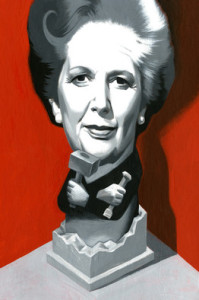
ILLUSTRATION: THOMAS FUCHS
Doing business overseas has put many enterprises on the road to making big money—but it can also be a quick way to lose a lot. Apple is vigorously fighting a bill for $14.5 billion in back taxes that the European Union says it owes Ireland. The iPhone maker will survive whatever happens, but the dispute illustrates the risks that businesses face when dealing with foreign governments. It’s a challenge that has grown more serious in recent years with the rise of aggressive nationalism in many countries.
In much of the ancient world, the presence of foreign merchants was regarded as a boon. During the third millennium B.C., the Mesopotamian ruler Sargon the Great boasted of his modern port facilities and the international trade that they attracted. The ancient Greeks went further and built specially protected ports for trade. There, taxes were low and legal rights were guaranteed, and foreigners could enter into contracts with confidence. Such arrangements enabled the Greeks to profit from extensive long-distance trading networks and proved inspirational to the Romans. Continue reading…








